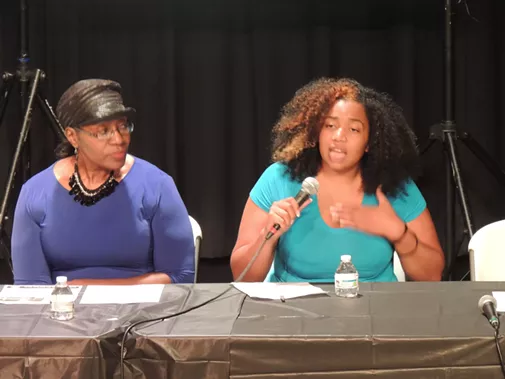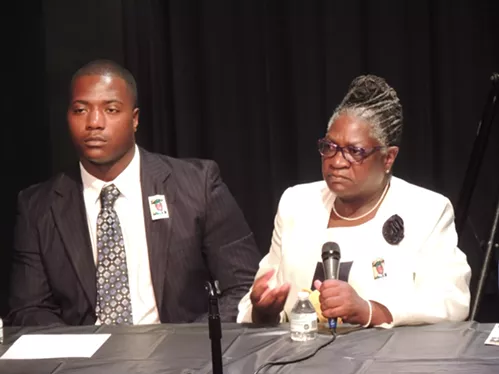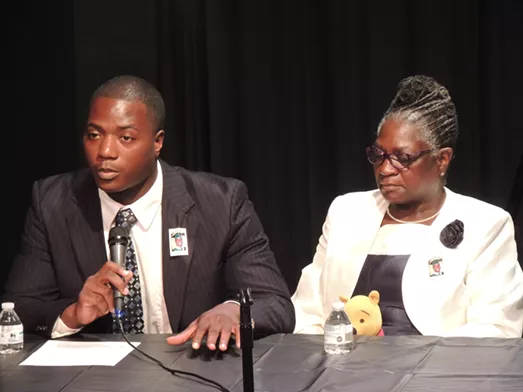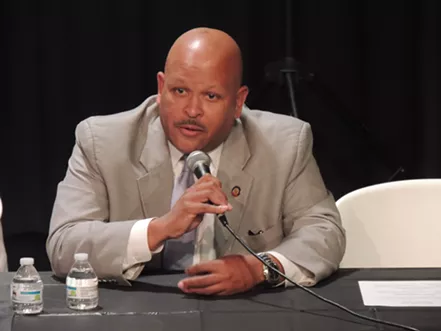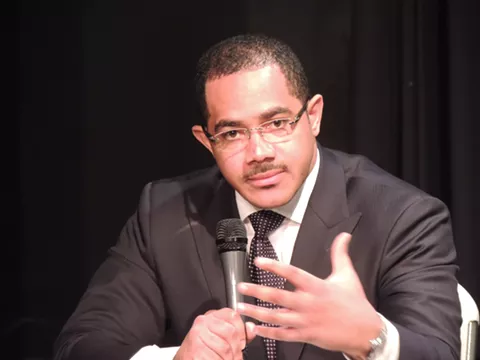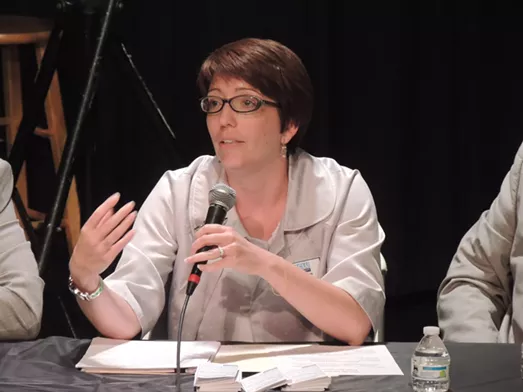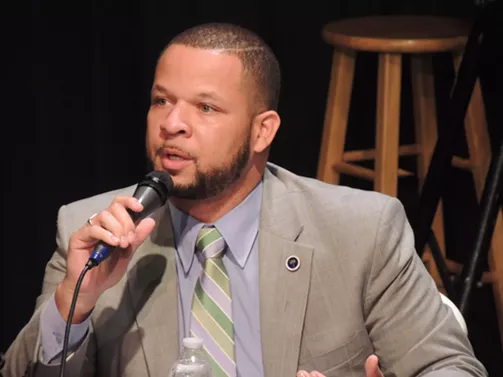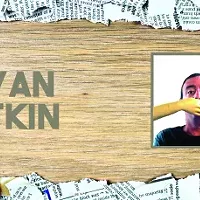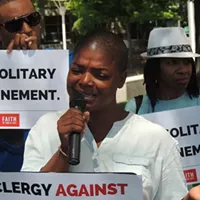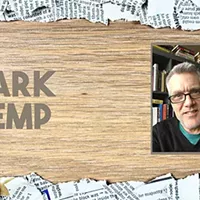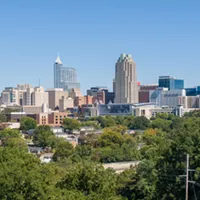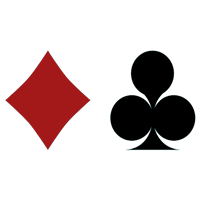Tuesday, July 21, 2015
News Local leaders speak on race relations following first day of Kerrick trial
Posted By Ryan Pitkin on Tue, Jul 21, 2015 at 5:30 PM
About 75 people showed up at Little Rock A.M.E. Zion Church on Monday evening for a panel discussion entitled “How Do We Heal” that included Jonathan Ferrell’s family members, representative of the NAACP, ACLU and elected officials to speak about race relations in Charlotte.
Two panels, one on activism and the other on political policy, spoke for about an hour and a half in total on subjects such as how activism can affect change, racial profiling, community leadership and other topics.
Below are some excerpts from the discussion.
On how to heal as a community following events such as the shooting death of unarmed Jonathan Ferrell by a white police officer:
Corine Mack, president, Charlotte NAACP - We’re no good to anyone else unless we heal first. I always say we need self-examination. We all have to look in the mirror and look at the issues that we need to heal. Black folks did not create racism, white folks did. It’s incumbent on whites, our good white brothers and sisters, to have real conversations with their counterparts, so that we can begin to have honest and deep conversations together. Some may learn from them and some may not, but at least start with that point, because for so many years, we’ve been politically correct and time’s up for that. We cannot let another African American boy or girl be killed; whether it’s at the hands of the police department, black on black crime or otherwise.
Marcelle Vielot, millennial organizer - I think it’s incredibly important that we begin this healing process by becoming comfortable with working together. I know that sounds really odd because a lot of us are church folks or folks who come together and congregate in houses of worship, but if we’re really trying to break down these barriers we have to really be comfortable with knocking on doors, getting in the street and talking to one another within our communities. I don’t know if you guys notice, but there are so many times when we don’t really interact with our neighbors; not in the way that we did before. The notion of community has really changed. We really have to break down those barriers and get comfortable with doing the dirty work.
Activism is not sexy, I tell people that all the time. You get sweaty, you stink, people don’t want to answer their phone whenever you call. But it’s work that needs to be done, because if we don’t do it, it’s not going to happen. This work means genuinely improving our community, not just kicking out people who we think shouldn’t be there. I mean actually reaching out. If something is wrong, we take that to our hearts and say, ‘We’re going to fix this,’ rather than take the easy way out. The easy way out has gotten us to this place where we don’t even know how to talk to each other anymore.
Georgia Ferrell, Jonathan Ferrell’s mother - What’s important to me is that first we have to heal. I love God first of all. I love my son. For me this is not about anything but speaking out for my son. I want peace. I love peace. Because we are a faith-believing family. Therefore, for me, faith means being a lover of God and everyone that surrounds you.
Willy Ferrell, Jonathan Ferrell’s brother - When it comes to faith, I think that’s what most people in today’s society are lacking. We are lacking faith, we are lacking belief, we are lacking the church period. If we can have faith and believe, we can make a change in the black community and the lower class.
On accountability:
Corine Mack - I hold myself accountable and I think we should all hold ourselves accountable. When you know somebody’s incorrect and they’re wrong, check them. We’ve been walking around here being so nice and sweet, when we know somebody’s wrong, and backbiting and gossiping about them instead of telling them they’re wrong.
I am not going to allow this city to become another Baltimore or Ferguson. My responsibility is to safeguard each and every citizen in this city; despite race, color, sexual orientation, or any other label you want to put on yourself. But I cant do it alone. I’m only one person, and I don’t have all the answers, which is why I love this room because it’s a room that says Charlotte has many different facets and faces. At the end of the day, if you don’t like something I’m saying or doing, come and have a conversation with me. In fact, I’ll embrace you for being honest with me because I’m going to be honest with you.
Marcelle Vielot - I think speaking truth to power is one of the most fundamental building blocks to holding people accountable. We cannot be afraid to speak to those frankly who we have paid to be in these positions; who we have trusted.
Most people who are in power in this city – and in any other city in this country – they are there because there is some major portion of the community who has trusted them to be there. You must know it is your duty to fight, and it is our duty to win, and we must combat whenever someone is doing wrong within our community. That’s the most important thing that I can say is, ‘Speak truth to power,’ because we have these people in their elected positions who aren’t doing anything.
Willy Ferrell - Social media is killing our people. Social media is the best and worst thing that could’ve happened to the lower and middle class. It can help you and it can hurt you. Every time I’m on social media, the first thing I see is multiple fights. There’s not anything fun about watching people calling each other out their names. Adults record two little kids fighting; that’s the most ignorant, childish thing I have ever seen. Our people in here, our friends and family, will Like this stuff. You will share this stuff just to get more Likes and become more popular; just to watch the lower class go further down into the ground.
We always look to everybody else but we are painting the picture for ourselves. Giving everybody the image that we don’t want to do anything but fight; giving everybody the image that we don’t want to do anything but curse each other. We have to make ourselves look better on social media and make ourselves look better whenever we go out.
An audience member asks what the panelists can say to someone who does everything “right” but is still harassed or falls victim to racial profiling or prejudice:
Corine Mack - For me it’s very upsetting when I hear “All lives matter.” I know that, but it’s been proven very clearly that black lives don’t matter to some people…We’re in a city that’s No. 3 in the banking system, where everybody walks around talking about how wonderful Uptown Charlotte is. All the money is being put into Uptown Charlotte at a time when they’re cutting after school programs. Nobody can tell me that “all lives matter” in this country, it’s just a slogan now, because blacks have been systemically oppressed, they still are. And for those that think they’ve arrived, when the cop stops you on the road, you’ll see.
An audience member asks why African-Americans always turn back to blaming themselves:
Marcelle Vielot - I think that’s a really profound statement, because a lot of people, especially people of color, really wrestle with that. Nobody wants to feel powerless. We’re up here talking about systemic violence, systemic racism and things like that. When you learn that boot-strapping is a lie – a super racist lie – then you do not want to adhere to the notion that it is out of your control.
We do have power. Every single one of us has power. There are things that are working that our greater than us, which is why we truly need to build together. Blaming ourselves is a system of white supremacy, it is a reaction to it.
The second panel consisted of elected officials, the Ferrell family’s attorney and a representative of the local ACLU.
On how policies can be passed to help heal racially divisive issues:
S.C. Rep. John King, Rock Hill - Sometimes you will see that, we don’t put our names on legislation, because the first time they see that an African American authors legislation or a Democrat authors legislation, it’s never heard. I offered legislation to put us back in session. That was never heard because it had my name on it. They took it and put their names on it and because of that today we have the Confederate flag down in South Carolina.
What we do as legislators; we have to understand the dynamics of our state, of our general assembly, of our elected bodies and work within those parameters to make certain things pass…If I have to get something past that’s going to help the community, I don’t care whose name is on it. My thing is moving my community forward.
N.C. Rep. Rodney Moore, Charlotte - It’s extremely tough. I don’t know what type of Republicans you’ve got in South Carolina, but I haven’t seen a worse bunch in my state house or state senate.
We will continue to fight for all of our citizens, but more especially for our core constituents, the people who most likely have put their trust in us, the people who look like us. So we have a special mission to take care of the cares and concerns and the aspirations of African American people as we legislate.
Christopher Chestnut, civil rights attorney - We have more folks in jail for nonviolent crimes…for drug offenses, yet we’re sitting here with the Ferrell family terrified that someone may get away with murder. We’re giving folks 30 years for dope and worried that we can’t get three years for murder.
You’ve got to vote as if President Obama was on the ballot. They know African Americans don’t vote on off years. You’ve got to vote consistently, that’s what politicians understand.
Sarah Preston, executive director, North Carolina ACLU - The concern of the ACLU has always been government transparency; holding government accountable. We take it on in a different way, in the form of public records requests. We send in records request and try to collect information about what policies there are out there, because we have our legislators at the state level. But even the police department is setting its own policy and their communities don’t even know what’s in those policies. So what we do is shine a light and get those policies changed if they’re not designed to serve the community.
On leadership (or lack thereof) in the African American community:
Rep. Moore - I think that we have a lot of divisions and different mantras and doctrines, but I think that the community looks to itself. I think we have enough talent in this city and county that we can come together with a common agenda, even though we have different ways of putting that agenda forward. We need to realize, as Dr. King said, that all of us are connected. Injustice anywhere is a threat to justice everywhere. We really need to put on our big boy and big girl pants and come together as a community and set some clear goals and principles with one another and say it does not matter who is the spokesman.
Christopher Chestnut - I took a trip to Israel last year, and met with a general of the Israeli army. I asked, ‘What did the African American community do differently than you all did to become so successful and garnish so much power and influence, not only with such little land but in such short time?’ I asked him to contrast that to African American experience in America and his response was, ‘Your community has no order.’ I think he was dead-on. When we ask who is the leader, the community has to make some hard decisions and more importantly stick by them. There’s no surprise to me in terms of not having an appointed leader. With all due respect, we don’t have concentrated power.
When we say we need to look to a leader, that leader needs to manifest itself and we need to support that leader before the time of crisis, not just let them show up in a crisis.
Rep. King - What has happened is that we have allowed people from outside of the African American community to say who our leaders are going to be, or they have defined this person through TV or the media as to who the leader is. What we need to do; the people who you have elected need to start leading and not just be happy to hold office. I sit and watch people who cannot even articulate sit in the (South Carolina) House of Representatives with me that look like me. We need to evaluate the people who we elect and who we call our leaders. We can’t put the burden on the general public, we have to take ownership as leaders and become leaders.
Sarah Preston - Another aspect is that there is a responsibility for law enforcement but also for local government to make themselves available and to have that conversation. To start a conversation with their community and I think, judging by how many people are in this room, I think a lot of people would come out for a conversation like that if local government were making themselves available to answer questions to talk about these issues.
On racial profiling:
Rep. Moore - North Carolina doesn’t look the same as it did when I was growing up some 40-odd years ago. We have many different languages, many different people that come here that love North Carolina just as much as those of us who grew up here. So we need our law enforcement to understand how to deal with this multicultural state that we find ourselves in.
(Speaking, at first, to the Ferrell family) My heart bleeds, it breaks for your family, but there are other Jonathan Ferrells that we have no idea about across this state and country, that have been victims of police profiling and arbitrary profiling and racial bias. We have to make a stand and we have to do something about it. So that’s my charge, to make sure that all of our lives are protected but more importantly that black lives matter and black lives are just as precious as any other.
On the Confederate flag:
Rep. King - The Confederate flag allows us to have a conversation where in the past we were so reluctant to talk about racism. The Confederate flag opened up a door in South Carolina that shamed the legislature, that shamed the Republican party, that shamed white folks in South Carolina to start talking about racism. Now that that door is open, we can start having a conversation about the inequities that we face in South Carolina.
Christopher Chestnut - We can’t subscribe to the picture because of the frame. Sometimes you can have a visceral reaction. I think we can learn a lot from Mrs. Ferrell, whose son was murdered in cold blood and she prayed and forgave him. Look at the families of the nine victims in South Carolina. The visceral reaction would be if you kill nine we’re going to take 10, but they prayed and forgave him.
If you really look at the Confederate flag; yes it’s a symbol of racism, but more importantly, it’s a symbol of being un-American. It symbolizes that they wanted to secede from the Union. So to fly the flag, racism is superceded by it being un-American. I don’t think any American can afford to support the irony of a state house within the 50 states flying the flag that says we shouldn’t be in the 50 states.
Two panels, one on activism and the other on political policy, spoke for about an hour and a half in total on subjects such as how activism can affect change, racial profiling, community leadership and other topics.
Below are some excerpts from the discussion.
On how to heal as a community following events such as the shooting death of unarmed Jonathan Ferrell by a white police officer:
Corine Mack, president, Charlotte NAACP - We’re no good to anyone else unless we heal first. I always say we need self-examination. We all have to look in the mirror and look at the issues that we need to heal. Black folks did not create racism, white folks did. It’s incumbent on whites, our good white brothers and sisters, to have real conversations with their counterparts, so that we can begin to have honest and deep conversations together. Some may learn from them and some may not, but at least start with that point, because for so many years, we’ve been politically correct and time’s up for that. We cannot let another African American boy or girl be killed; whether it’s at the hands of the police department, black on black crime or otherwise.
Marcelle Vielot, millennial organizer - I think it’s incredibly important that we begin this healing process by becoming comfortable with working together. I know that sounds really odd because a lot of us are church folks or folks who come together and congregate in houses of worship, but if we’re really trying to break down these barriers we have to really be comfortable with knocking on doors, getting in the street and talking to one another within our communities. I don’t know if you guys notice, but there are so many times when we don’t really interact with our neighbors; not in the way that we did before. The notion of community has really changed. We really have to break down those barriers and get comfortable with doing the dirty work.
Activism is not sexy, I tell people that all the time. You get sweaty, you stink, people don’t want to answer their phone whenever you call. But it’s work that needs to be done, because if we don’t do it, it’s not going to happen. This work means genuinely improving our community, not just kicking out people who we think shouldn’t be there. I mean actually reaching out. If something is wrong, we take that to our hearts and say, ‘We’re going to fix this,’ rather than take the easy way out. The easy way out has gotten us to this place where we don’t even know how to talk to each other anymore.
Georgia Ferrell, Jonathan Ferrell’s mother - What’s important to me is that first we have to heal. I love God first of all. I love my son. For me this is not about anything but speaking out for my son. I want peace. I love peace. Because we are a faith-believing family. Therefore, for me, faith means being a lover of God and everyone that surrounds you.
Willy Ferrell, Jonathan Ferrell’s brother - When it comes to faith, I think that’s what most people in today’s society are lacking. We are lacking faith, we are lacking belief, we are lacking the church period. If we can have faith and believe, we can make a change in the black community and the lower class.
On accountability:
Corine Mack - I hold myself accountable and I think we should all hold ourselves accountable. When you know somebody’s incorrect and they’re wrong, check them. We’ve been walking around here being so nice and sweet, when we know somebody’s wrong, and backbiting and gossiping about them instead of telling them they’re wrong.
I am not going to allow this city to become another Baltimore or Ferguson. My responsibility is to safeguard each and every citizen in this city; despite race, color, sexual orientation, or any other label you want to put on yourself. But I cant do it alone. I’m only one person, and I don’t have all the answers, which is why I love this room because it’s a room that says Charlotte has many different facets and faces. At the end of the day, if you don’t like something I’m saying or doing, come and have a conversation with me. In fact, I’ll embrace you for being honest with me because I’m going to be honest with you.
Marcelle Vielot - I think speaking truth to power is one of the most fundamental building blocks to holding people accountable. We cannot be afraid to speak to those frankly who we have paid to be in these positions; who we have trusted.
Most people who are in power in this city – and in any other city in this country – they are there because there is some major portion of the community who has trusted them to be there. You must know it is your duty to fight, and it is our duty to win, and we must combat whenever someone is doing wrong within our community. That’s the most important thing that I can say is, ‘Speak truth to power,’ because we have these people in their elected positions who aren’t doing anything.
Willy Ferrell - Social media is killing our people. Social media is the best and worst thing that could’ve happened to the lower and middle class. It can help you and it can hurt you. Every time I’m on social media, the first thing I see is multiple fights. There’s not anything fun about watching people calling each other out their names. Adults record two little kids fighting; that’s the most ignorant, childish thing I have ever seen. Our people in here, our friends and family, will Like this stuff. You will share this stuff just to get more Likes and become more popular; just to watch the lower class go further down into the ground.
We always look to everybody else but we are painting the picture for ourselves. Giving everybody the image that we don’t want to do anything but fight; giving everybody the image that we don’t want to do anything but curse each other. We have to make ourselves look better on social media and make ourselves look better whenever we go out.
An audience member asks what the panelists can say to someone who does everything “right” but is still harassed or falls victim to racial profiling or prejudice:
Corine Mack - For me it’s very upsetting when I hear “All lives matter.” I know that, but it’s been proven very clearly that black lives don’t matter to some people…We’re in a city that’s No. 3 in the banking system, where everybody walks around talking about how wonderful Uptown Charlotte is. All the money is being put into Uptown Charlotte at a time when they’re cutting after school programs. Nobody can tell me that “all lives matter” in this country, it’s just a slogan now, because blacks have been systemically oppressed, they still are. And for those that think they’ve arrived, when the cop stops you on the road, you’ll see.
An audience member asks why African-Americans always turn back to blaming themselves:
Marcelle Vielot - I think that’s a really profound statement, because a lot of people, especially people of color, really wrestle with that. Nobody wants to feel powerless. We’re up here talking about systemic violence, systemic racism and things like that. When you learn that boot-strapping is a lie – a super racist lie – then you do not want to adhere to the notion that it is out of your control.
We do have power. Every single one of us has power. There are things that are working that our greater than us, which is why we truly need to build together. Blaming ourselves is a system of white supremacy, it is a reaction to it.
The second panel consisted of elected officials, the Ferrell family’s attorney and a representative of the local ACLU.
On how policies can be passed to help heal racially divisive issues:
S.C. Rep. John King, Rock Hill - Sometimes you will see that, we don’t put our names on legislation, because the first time they see that an African American authors legislation or a Democrat authors legislation, it’s never heard. I offered legislation to put us back in session. That was never heard because it had my name on it. They took it and put their names on it and because of that today we have the Confederate flag down in South Carolina.
What we do as legislators; we have to understand the dynamics of our state, of our general assembly, of our elected bodies and work within those parameters to make certain things pass…If I have to get something past that’s going to help the community, I don’t care whose name is on it. My thing is moving my community forward.
N.C. Rep. Rodney Moore, Charlotte - It’s extremely tough. I don’t know what type of Republicans you’ve got in South Carolina, but I haven’t seen a worse bunch in my state house or state senate.
We will continue to fight for all of our citizens, but more especially for our core constituents, the people who most likely have put their trust in us, the people who look like us. So we have a special mission to take care of the cares and concerns and the aspirations of African American people as we legislate.
Christopher Chestnut, civil rights attorney - We have more folks in jail for nonviolent crimes…for drug offenses, yet we’re sitting here with the Ferrell family terrified that someone may get away with murder. We’re giving folks 30 years for dope and worried that we can’t get three years for murder.
You’ve got to vote as if President Obama was on the ballot. They know African Americans don’t vote on off years. You’ve got to vote consistently, that’s what politicians understand.
Sarah Preston, executive director, North Carolina ACLU - The concern of the ACLU has always been government transparency; holding government accountable. We take it on in a different way, in the form of public records requests. We send in records request and try to collect information about what policies there are out there, because we have our legislators at the state level. But even the police department is setting its own policy and their communities don’t even know what’s in those policies. So what we do is shine a light and get those policies changed if they’re not designed to serve the community.
On leadership (or lack thereof) in the African American community:
Rep. Moore - I think that we have a lot of divisions and different mantras and doctrines, but I think that the community looks to itself. I think we have enough talent in this city and county that we can come together with a common agenda, even though we have different ways of putting that agenda forward. We need to realize, as Dr. King said, that all of us are connected. Injustice anywhere is a threat to justice everywhere. We really need to put on our big boy and big girl pants and come together as a community and set some clear goals and principles with one another and say it does not matter who is the spokesman.
Christopher Chestnut - I took a trip to Israel last year, and met with a general of the Israeli army. I asked, ‘What did the African American community do differently than you all did to become so successful and garnish so much power and influence, not only with such little land but in such short time?’ I asked him to contrast that to African American experience in America and his response was, ‘Your community has no order.’ I think he was dead-on. When we ask who is the leader, the community has to make some hard decisions and more importantly stick by them. There’s no surprise to me in terms of not having an appointed leader. With all due respect, we don’t have concentrated power.
When we say we need to look to a leader, that leader needs to manifest itself and we need to support that leader before the time of crisis, not just let them show up in a crisis.
Rep. King - What has happened is that we have allowed people from outside of the African American community to say who our leaders are going to be, or they have defined this person through TV or the media as to who the leader is. What we need to do; the people who you have elected need to start leading and not just be happy to hold office. I sit and watch people who cannot even articulate sit in the (South Carolina) House of Representatives with me that look like me. We need to evaluate the people who we elect and who we call our leaders. We can’t put the burden on the general public, we have to take ownership as leaders and become leaders.
Sarah Preston - Another aspect is that there is a responsibility for law enforcement but also for local government to make themselves available and to have that conversation. To start a conversation with their community and I think, judging by how many people are in this room, I think a lot of people would come out for a conversation like that if local government were making themselves available to answer questions to talk about these issues.
On racial profiling:
Rep. Moore - North Carolina doesn’t look the same as it did when I was growing up some 40-odd years ago. We have many different languages, many different people that come here that love North Carolina just as much as those of us who grew up here. So we need our law enforcement to understand how to deal with this multicultural state that we find ourselves in.
(Speaking, at first, to the Ferrell family) My heart bleeds, it breaks for your family, but there are other Jonathan Ferrells that we have no idea about across this state and country, that have been victims of police profiling and arbitrary profiling and racial bias. We have to make a stand and we have to do something about it. So that’s my charge, to make sure that all of our lives are protected but more importantly that black lives matter and black lives are just as precious as any other.
On the Confederate flag:
Rep. King - The Confederate flag allows us to have a conversation where in the past we were so reluctant to talk about racism. The Confederate flag opened up a door in South Carolina that shamed the legislature, that shamed the Republican party, that shamed white folks in South Carolina to start talking about racism. Now that that door is open, we can start having a conversation about the inequities that we face in South Carolina.
Christopher Chestnut - We can’t subscribe to the picture because of the frame. Sometimes you can have a visceral reaction. I think we can learn a lot from Mrs. Ferrell, whose son was murdered in cold blood and she prayed and forgave him. Look at the families of the nine victims in South Carolina. The visceral reaction would be if you kill nine we’re going to take 10, but they prayed and forgave him.
If you really look at the Confederate flag; yes it’s a symbol of racism, but more importantly, it’s a symbol of being un-American. It symbolizes that they wanted to secede from the Union. So to fly the flag, racism is superceded by it being un-American. I don’t think any American can afford to support the irony of a state house within the 50 states flying the flag that says we shouldn’t be in the 50 states.
Speaking of...
Comments (4)
Showing 1-4 of 4
Latest in The CLog
More by Ryan Pitkin
-
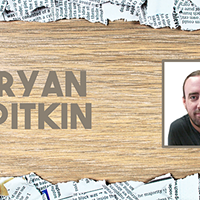
You're the Best... of Charlotte
Oct 27, 2018 -
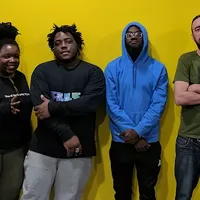
Listen Up: Cuzo Key and FLLS Go 'Universal' on 'Local Vibes'
Oct 25, 2018 -
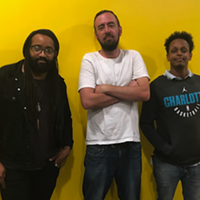
Listen Up: KANG is Back and Bla/Alt on 'Local Vibes'
Oct 18, 2018 - More »


